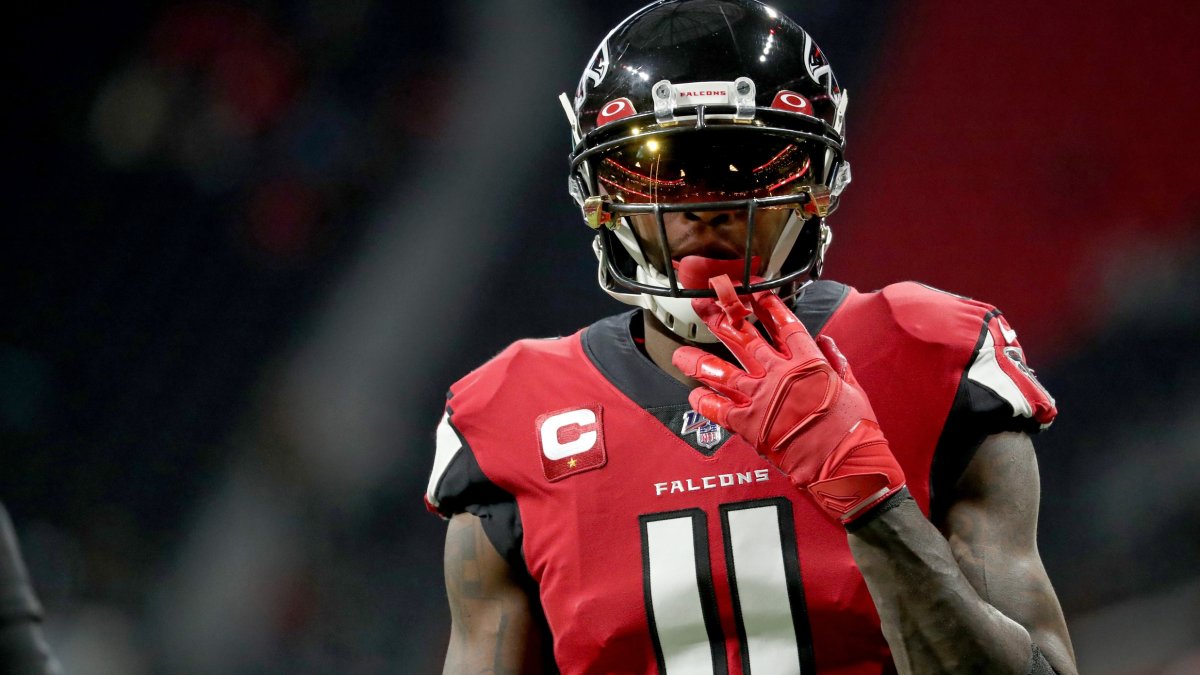When the Julio Jones trade talks began to heat up around draft time, an important NFL date was emphasized in consideration of a potential move. June 1 is one of the biggest trigger dates on the league calendar when it comes to salary cap considerations.
The reason is fairly simple: Teams can take on less dead cap money in the current year if they cut or trade a player after June 1. While the end result from a financial perspective will be the same over a two-year period, extra upfront cap relief can provide flexibility and enable a team to spend more now.
Using Julio Jones as our example, here is how a trade would impact the Atlanta Falcons’ salary cap depending on whether the transaction was executed before or after June 1:
Pre-June 1 trade
| Year | Base salary | Prorated bonus | Cap Number | Dead Money | Cap Savings |
| 2021 | $15,300,000 | $7,750,000 | $23,050,000 | $23,250,000 | -($200,000) |
| 2022 | $11,513,000 | $7,750,000 | $19,263,000 | – | $19,263,000 |
| 2023 | $11,513,000 | $7,750,000 | $19,263,000 | – | – |
Post-June 1 trade
| Year | Base salary | Prorated bonus | Cap Number | Dead Money | Cap Savings |
| 2021 | $15,300,000 | $7,750,000 | $23,050,000 | $7,750,000 | $15,300,000 |
| 2022 | $11,513,000 | $7,750,000 | $19,263,000 | $15,500,000 | $3,763,000 |
| 2023 | $11,513,000 | $7,750,000 | $19,263,000 | – | – |
The end result on the books is the same: Atlanta takes on a total of $23.25 million in dead cap and saves $19.063 million on the cap. However, before June 1, Atlanta would bear the full burden of the dead cap figure all in 2021. After June 1, the prorated bonus amounts for 2022 and 2023 would accelerate onto the 2022 cap, providing $15.5 million of upfront relief for the cap-strapped Falcons. Remember, the salary cap is really just an accounting mechanism, after all.
Julio is not the only player this offseason with a significant difference between the cap treatment of his contract if his club were to trade him before or after June 1. Five other players — all the subjects of trade rumors to varying degrees — find themselves in similar situations with June 1 less than a week away.
Subscribe to
Atlanta Falcons WR Julio Jones
Hypothetical Trade: Julio Jones & 2022 6th → New England Patriots for 2022 2nd, 2022 5th
Pre-June 1 dead money: $23,250,000
Pre-June 1 cap savings: -$200,000
Post-June 1 dead money: $7,750,000
Post-June 1 cap savings: $15,300,000
Difference in 2021 cap savings: $15,500,000
Even following the additions of Nelson Agholor and Kendrick Bourne, New England stands out as a team that should still be in the market for a true No. 1 outside receiver. In 2020, the Patriots ranked 28th in passing grade to receivers lined up out wide (70.2).
Furthermore, even following the retirement of long-time slot receiver Julian Edelman, Jakobi Meyers is predominantly a slot receiver (60% of career snaps), and Agholor (47%) and Bourne (38%) have logged significant snaps on the inside, as well. With New England likely to run the most 12 personnel in the NFL in 2021, Julio commanding significant attention on the outside would go a long way toward opening things up for this offense over the middle.
Exclusive content for premium subscribers

WANT TO KEEP READING?
Dominate Fantasy Football & Betting with AI-Powered Data & Tools Trusted By All 32 Teams
Already have a subscription? Log in



 © 2025 PFF - all rights reserved.
© 2025 PFF - all rights reserved.